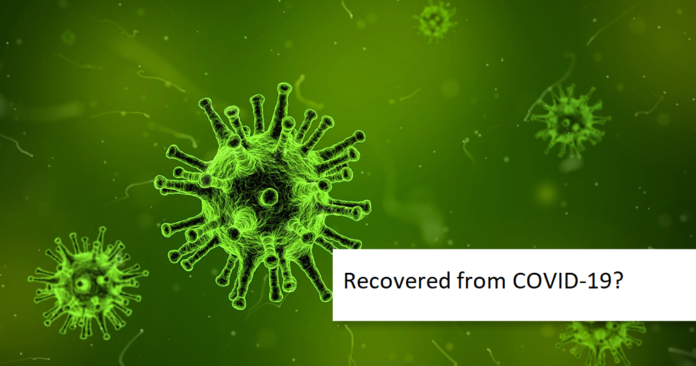Don’t Let your Guard Down
It’s been a while now since the COVID-19 pandemic started. People are slowly learning of many different ways to deal with the pandemic — both in terms of prevention and recovery. It is a known fact that the virus that causes COVID-19, once it is inside our body, does not isolate and attack just the respiratory system alone, but also affects one’s brain, heart, kidneys and the digestive system, amongst other organs.
A research study conducted in Italy and published in the Journal of the American Medical Association (JAMA) revealed that certain symptoms of Covid-19 persist much beyond a negative test. The study published in JAMA showed in that more than 87 per cent of patients, who recovered from COVID-19, reported dyspnoea (difficult or laboured breathing) and some kind of fatigue as persisting symptoms even after two months of being discharged from the hospital
There can be long-term side effects of COVID-19 infection
A few patients who had recovered had to be rushed back to the hospital with low oxygen saturation levels, sometimes just a day after their discharge. Such patients remained admitted in the hospital for at least 10 more days, and were discharged only after they started showing signs of recovery. Most of these patients came back to the hospital with a whole range of lung diseases – right from fibrosis (development of hard fibrous tissues as the lung heals from injury) to secondary infections including pneumonia.
It was also observed that after recovering from COVID-19 infection, some patients came back to the healthcare facility with reduced heart function, heart attack or even stroke.
The virus, which is now known to attack the endothelial cells that line our blood vessels, causes excessive blood clotting in our body. Today, since the infection has been in our country for more than five months, there is an urgent need for us to start looking into post-COVID-19 rehabilitation.
Post COVID-19 Syndrome
These are the long and short-term consequences of COVID-19 infection which is now referred to as the ‘Post COVID-19 syndrome’.
This means that after the acute phase of COVID-19 infection is over, patients come back to the hospitals with symptoms like itchy throats, lethargy and body aches, even 4-6 weeks after recovery. Patients have also displayed some psychological stress, such as depression and anxiety.
Symptoms of Post COVID-19 Syndrome
Post COVID-19 syndrome symptoms include:
- Chronic fatigue
- Nausea
- Persistent diarrhea
- Abnormal heart rate
- Digestive issues and rapid weight loss
- Loss of appetite including sense of smell and taste
- Muscle weakness
- Mild to severe inflammation in the brain
- Disturbed sleep patterns
- Reduced exercise tolerance
- Mental implications like Insomnia, Depression, etc.
Monitoring such cases are of utmost importance, and a proper rehabilitation plan post discharge, needs to be put in place for monitoring the health of the patients and timely intervention.
Recommended Assessments if you are a COVID-19 survivors
The Infectious Disease (ID) Specialists recommend following assessments if you are COVID-19 survivors:
- Seek follow up consultation with the treating doctor within the first week of discharge
- Get blood investigations like CRP, CBC done at first follow up, and subsequent follow-ups, if advised by your treating doctor
- Check oxygen saturation every day, it should be maintained at >94 per cent in room air.
- Watch out for respiratory symptoms, such as persistence or worsening cough and breathlessness
- Check for continuous rise of body temperature (above 100 F).
- Monitor blood sugar regularly (for known diabetic patients). COVID-19 infection, as any other viral infection, alters the blood sugar levels of your body. For diabetic patients, strict blood sugar monitoring once in three days and regular consultation with your doctor is mandatory
- Monitoring blood pressure regularly (for known hypertensive patients) is a must to avoid accelerated hypertension-related complications. Monitoring blood pressure every week in case of controlled hypertension, or more often in case of abnormal readings, is mandatory.
- Look out for signs of drowsiness, lethargy and altered sensorium
- Repeat HRCT scan (CT scan of the chest) after three months to look at the extent of lung recovery after the infection.
Secondary complications like pulmonary embolism, pulmonary fibrosis, coagulopathy (excessive bleeding or clotting), renal (kidney) failure, acute stroke, liver dysfunction, and heart attack are highly common in post COVID infections
Conclusion
Remember, post-COVID-19 Syndrome must be dealt through proper clinical assessment, psychological intervention and comprehensive rehabilitative care. The first step towards helping a patient tackle the residual impact of the infection is the clinical assessment from an Infectious Disease Specialist at a dedicated post-COVID-19 Out-patient Department.
Physical rehabilitation may play a significant role in managing mobility, muscle weakness and decreased/ increased exercise tolerance. Besides, the psychological evaluation also plays a crucial role in addressing PTSD (Post traumatic stress disorder) amongst those who have battled severe COVID19 infection and have had a prolonged stay in the hospital. These areas of focus will help in diagnosing and treating both long-term and short-term complications amongst COVID-19 survivors.


















